The Adventure Game

Contents |
Host
The Argonds:
Darong: Moira Stuart (series 1)
The Rangdo of Arg ("Uncle"): Ian Messiter (series 1)
Gnoard: Charmian Gradwell (series 1-3)
Gandor the Butler: Christopher Leaver (series 1-4)
Rongad (Dagnor): Bill Homewood (series 3-4)
Dorgan: Sarah Lam (series 4)
Co-hosts
Lesley Judd: the Mole
Broadcast
BBC 1, 24th May 1980-21st June 1980 (5 episodes)
BBC 2, 2nd November 1981-18 February 1986 (17 episodes in 3 more series)
Synopsis
Little marvel that brightened up many teatime, often thought of as the forerunner of The Crystal Maze.
Three rent-a-celeb types were guided around a series of mental and physical puzzles devised by Patrick Dowling. The puzzles usually involved logical thinking with some lateral twists.
The show had quite a cute backplot. Set on the planet Arg, the inhabitants (sometimes human, sometimes dragon shape-changers called "the Argonds") put the contestants through their paces, including:
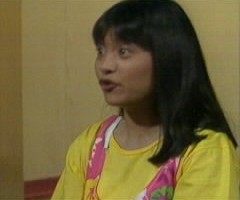 Dorgan, the friendly helpful one that got the contestants under way.
Dorgan, the friendly helpful one that got the contestants under way.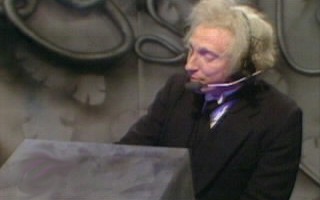 Gandor the Butler, who used an ear trumpet to help him see, and wore his glasses to help him hear.
Gandor the Butler, who used an ear trumpet to help him see, and wore his glasses to help him hear.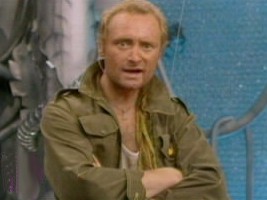 Dagnor, the backwards-talking Australian who would compliment contestants with a "Doogy Rev" if they'd done well.
Dagnor, the backwards-talking Australian who would compliment contestants with a "Doogy Rev" if they'd done well.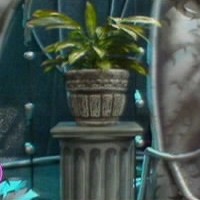 Rangdo, the shy ruler of the planet that took the physical prescience of an Aspidistra (or, later, a teapot).
Rangdo, the shy ruler of the planet that took the physical prescience of an Aspidistra (or, later, a teapot).Also of note is The Red Salamander, a mute but very tall lizard who often played against the contestants in the Drogna game when competing for prizes such as green cheese rolls (see later).
Anagrams-R-Us
As you may have noticed by now, nearly everything to do with the game was an anagram of "dragon", including the obligatory salute "Gronda, Gronda". The currency on the planet was the Drogna, which were clear plastic pieces containing a coloured shape in the middle. The value of the drogna was equal to the number of sides on the shape, multiplied by their position in the rainbow (hence a sign saying Richard of York Gained Battle on the wall).
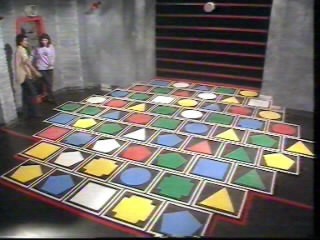 The Drogna Game
The Drogna GameOne of the initial challenges, the "drogna game", was a floor-tile puzzle that made use of these shapes. A particular logic applied to where you could or couldn't move (e.g. you can only move to a square with the same shape or colour).
One of the sub-games involved the contestants finding Lesley Judd, who would turn out to be The Mole and attempt to sabotage subsequent challenges.
Other games were wide and varied, but included stepping through a series of poles, guiding a mouse around a computer maze, interacting with the Argonds and their strange quirks, defeating the Red Salamander at the Drogna game, guiding a fellow player out of a pitch-black room, gentle physics problems, and solving codes.
Although the challenges in each programme were all variations-on-a-theme throughout the series, the final round in later shows was always the superb Vortex game, where the contestants had to cross a hexagonal lattice.
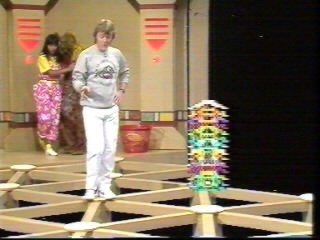 Cheggers stares the dreaded Vortex in the eye - but he can't see it
Cheggers stares the dreaded Vortex in the eye - but he can't see itThey had to move without stepping on the same space as the vortex, which would "evaporate" them. The contestant and the vortex (which was invisible to the contestants but visible to the viewers) would take one turn each move.
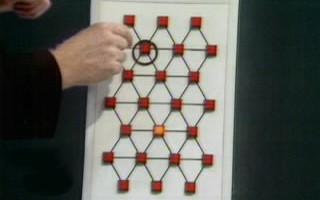 The next Vortex move is plotted
The next Vortex move is plottedOnly by logic, guesswork, and the occasional use of green cheese rolls (which could be used to identify where the vortex was) could the team get across safely to the waiting shuttle. Otherwise they had to walk home, and it's a long way from Arg to Earth. Nail-biting stuff.
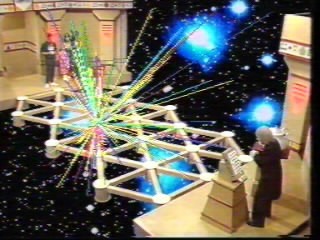 Aaaaaaaaaaagh! The Vortex claims another victim
Aaaaaaaaaaagh! The Vortex claims another victimOne other feature worth mentioning is the "phone links" in later series where one of the hosts would ask children at home what they should do. Didn't really add much to the game, truth be told.
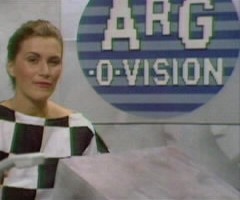
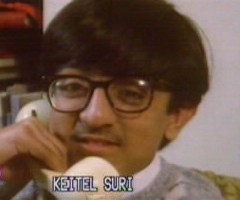 Enjoy your 30 seconds of fame talking to Gnoard while it lasts, Keitel
Enjoy your 30 seconds of fame talking to Gnoard while it lasts, KeitelKey moments
Much celebration when a contestant managed to get across the Vortex grid, even though it meant Rangdo (the Aspidistra) got very angry indeed.
Catchphrases
"Gronda, Gronda!"
"Doogy rev!"
Inventor
The Adventure Game came about because producer Ian Oliver and devisor Patrick Dowling, both having previously worked together on an educational mathematics programme, had an interest in Dungeons and Dragons and wished to televise it.
Theme music
Duo In G Opus 34, composed by Carulli and performed by Julian Bream and John Williams.
A music clip is available from the TV Cream site.
Trivia
Despite popular myth, the programme was always intended to be a children's show. The first series went out at 9.30am on Saturdays, but subsequent programmes were put out at teatime to pick up older children too.
The credits listed the actors and characters the "wrong" way around, so (e.g.) the character of Christopher Leaver was played by Gandor, and so on.
The animatronic aspidistra version of the Rangdo of Arg was controlled by Kenny Baker, he of R2-D2 fame.
Episode list
Adventurers on each episode were:
Series 1
24.05.80 - Elizabeth Estensen, Fred Harris, Mark Dugdale
31.05.80 - Liza Goddard, Michael Rodd, Stephen Cox
07.06.80 - James Burke, Maggie Philbin, Pat Cater
14.06.80 - Denise Coffey, Dr Garry Hunt, Toby Freeman
21.06.80 - Paul Darrow, Lesley Judd, Robert Malos
This series featured Darong as Moira Stewart, the Argond who introduced the show. The Rangdo of Arg had a human form in the shape of Ian Messiter. It was first aired on BBC1 during Saturday mornings, and repeated on BBC2's Saturday afternoon children's block during October 1980. Some sources suggest a sixth episode was made, but never transmitted.
Series 2
02.11.81 - Graeme Garden, Carol Chell, Nicholas Hammond
09.11.81 - Madeleine Smith, David Yip, Derek Gale
16.11.81 - David Singmaster, Sue Cook, Philip Sheppard
23.11.81 - Tessa Hamp, Nerys Hughes, Derek Griffiths
30.11.81 - John Craven, Bill Green, Kirsty Miller
This series featured Lesley Judd as the resident mole. It first aired on BBC2 on Monday evenings, and was repeated during regular children's programming on Friday afternoon BBC1 from 28 May 1982.
Series 3
02.02.84 - Sarah Greene, Anne Miller, Richard Stilgoe
09.02.84 - Sue Nicholls, Duncan Goodhew, Emma Disley
16.02.84 - Sandra Dickinson, Chris Serle, Adam Tandy
23.02.84 - Paul McDowell, Bonnie Langford, Christopher Hughes
01.03.84 - Neil Adams, Nigel Crocket, Janet Fielding
08.03.84 - Fern Britton, Noel Edmonds, Ray Virr
This run featured Bill Homewood as Ron Gad, and repeated from 5 September 1985. Both airings were early evenings on BBC2
Series 4
07.01.86 - Sheelagh Gilby, Ian McNaught-Davis, Roy Cane
14.01.86 - Barbara Lott, Johnny Ball, Liz Hobbs
21.01.86 - Fiona Kennedy, Ian McCaskill, David Sanderman
04.02.86 - Ruth Madoc, Prof Heinz Wolff, Deborah Leigh Hall
11.02.86 - Joanna Munro, George Layton, Val Prince
18.02.86 - Heather Couper, Keith Chegwin, Adam Gilby
This series included a write-in question, and was not repeated until partially re-surfacing on Challenge during January 2003. The original run, on Tuesday evening, was taken off air on 28 January 1986 for a news report about the Challenger disaster; the episode aired out of sequence two weeks later.
Merchandise
A game for the BBC Micro computer, called Drogna, was released by Acornsoft.
Web links
Jools' Adventure Game page - appears to have gone offline, sadly.
Pictures
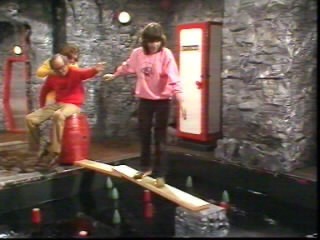 Picture 1 - Maggie Philbin tries to cross the pool.
Picture 1 - Maggie Philbin tries to cross the pool.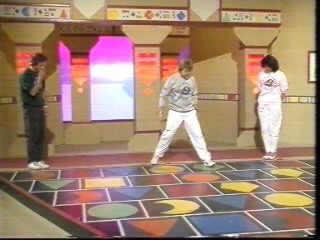 Picture 2 - Keith Chegwin crossing the drogna game board.
Picture 2 - Keith Chegwin crossing the drogna game board. 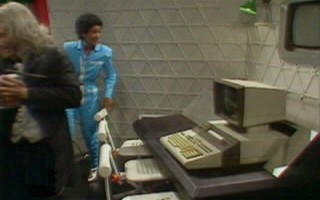 Picture 3 - A real computer. Ooooh!
Picture 3 - A real computer. Ooooh!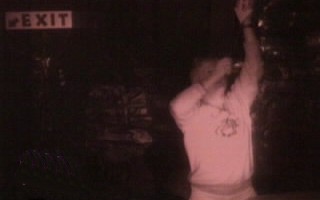 Picture 4 - Someone tries to claw their way out of the black hole.
Picture 4 - Someone tries to claw their way out of the black hole.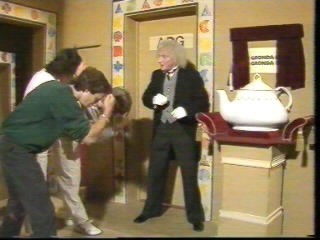 Picture 5 - "Gronda, Gronda" - the contestants pay their respects.
Picture 5 - "Gronda, Gronda" - the contestants pay their respects.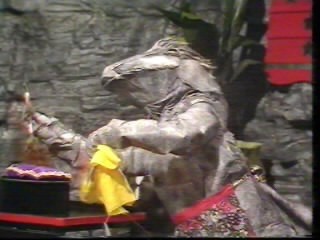 Picture 6 - An Argond.
Picture 6 - An Argond.
